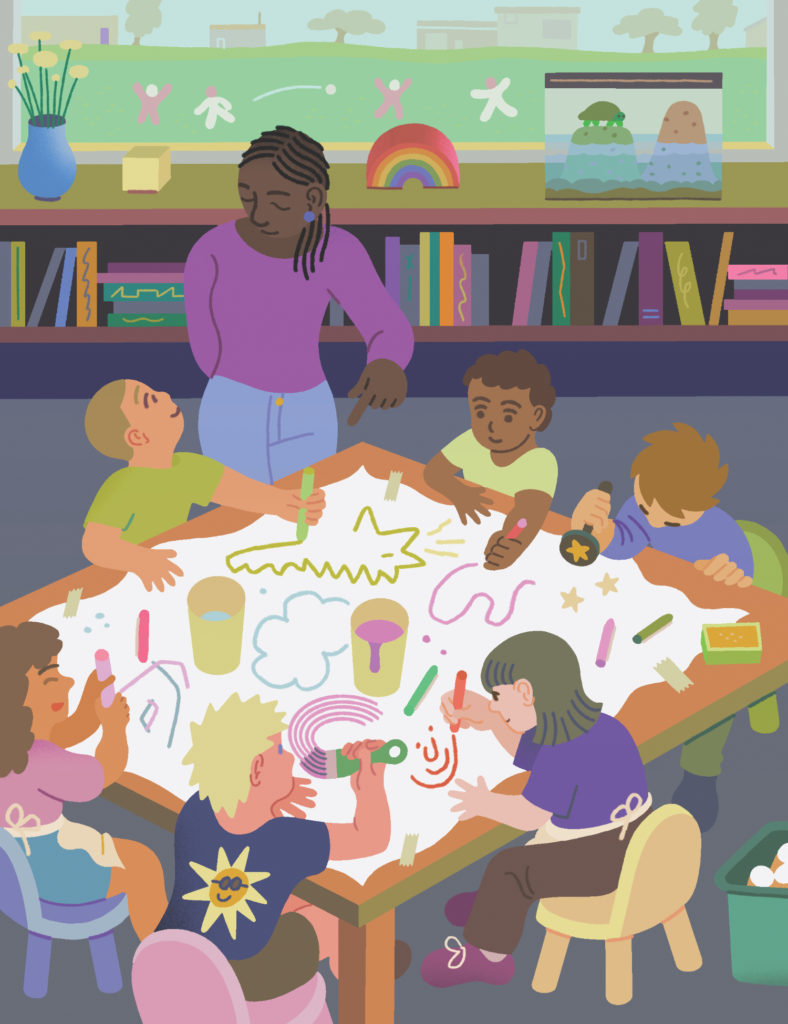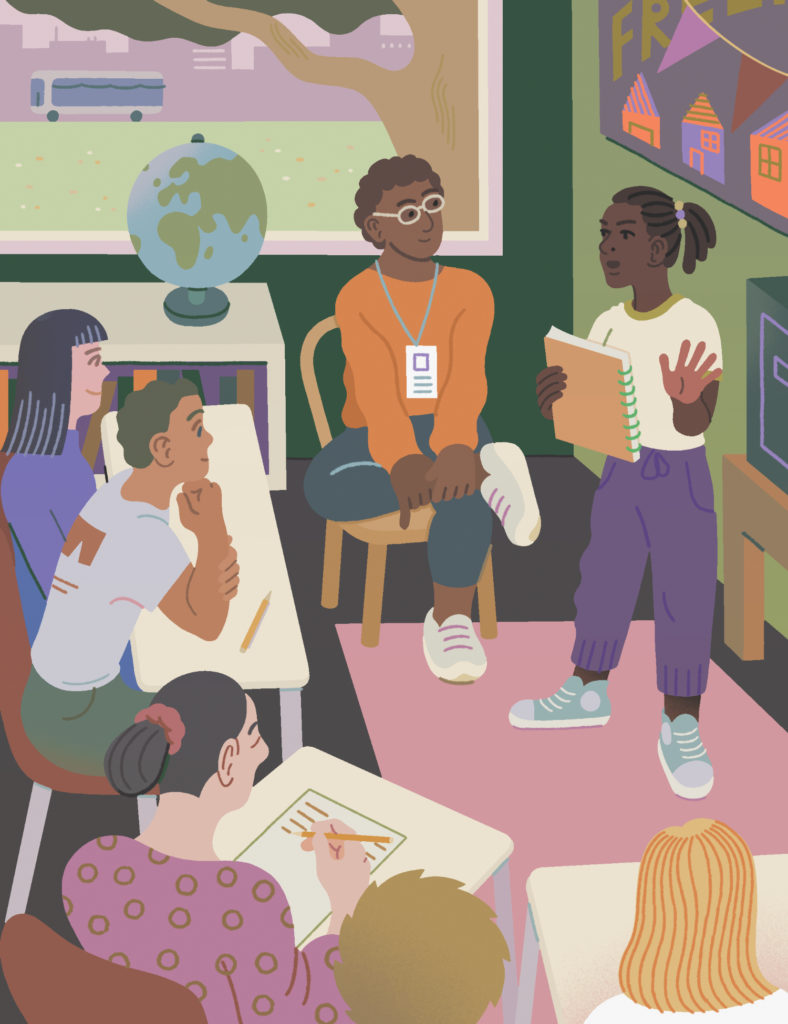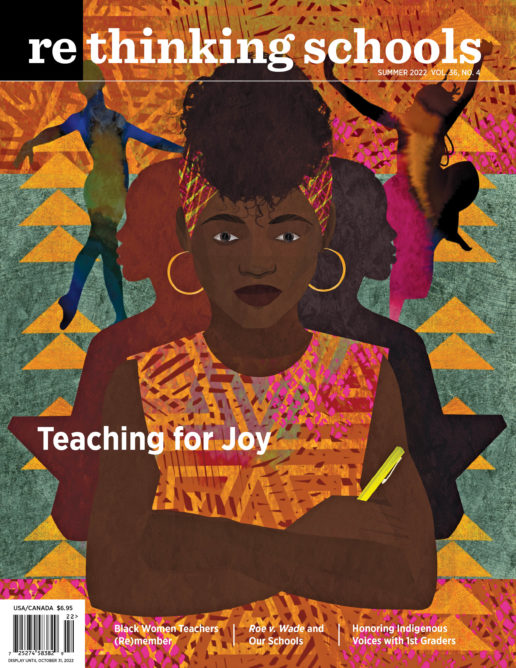Recommitting to the Joyful Classroom
Illustrator: Sophia Foster-Dimino

The world is broken. But instead of giving up, instead of resigning, teachers need to pivot to make teaching an act of defiance, a declaration that the only way forward is through lessons that teach students to remember joy, to activate their muscles of imagination, kindness, laughter, playfulness, and solidarity.
The fear that the world cannot be mended is a story told by those who benefit from today’s distorted relationships of wealth and power, and thus have an interest in keeping us docile. So instead of surrendering to despair, let us choose to create a different path.
We must reject district initiatives that begin from a narrative of “learning loss,” echoing the tired lines used over the decades to track students by their test scores with problematic and inaccurate assessments tied to ineffective and deadening teaching. What our youth don’t need is another year of a fact-packing, harried pace of “catching up” because they are “behind.” They need lessons that intimately link the struggles of their families and communities to past and present struggles for justice around the world. They need a curriculum that teaches them to unravel the causes of racism, our climate crisis, the vast and growing economic inequality, houselessness, and war. They need to probe social reality through activities that can simultaneously build their literacy and numeracy skills and their capacity to imagine a different world — and, at the same time, fire them to life. They need a steady diet of narrative and poetry writing about their lives that tethers them back to joyful moments of their childhood, memories of standing with others, hilarious stories that remind them of laughing big, belly laughs as well as weeping collectively at shared tragedy. We need to reject the supposed need to be “efficient” in the classroom and instead take the time required to restore young people’s fractured relationships with others. What may be efficient at racing another few pages through the textbook may be decidedly inefficient at building community and a love of learning. Our students need to pause to share their work in read-arounds, even when these take “valuable” class time, because sharing their writing and their stories connects young people and nurtures friendship as well as academic skills.
Instead of surrendering to despair, let us choose to create a different path.
In We Want to Do More Than Survive: Abolitionist Teaching and the Pursuit of Educational Freedom, Bettina Love argues that joy is a product of the Black freedom struggle — and has animated that struggle; it renounces alienation, oppression, exploitation:
Simply put, many of our schools function as spaces of dark suffering. . . . What is astonishing is that through all the suffering the dark body endures, there is joy, Black joy. I do not mean the type of fabricated and forced joy found in a Pepsi commercial; I am talking about joy that originates in resistance, joy that is discovered in making a way out of no way, joy that is uncovered when you know how to love yourself and others, joy that comes from releasing pain, joy that is generated in music and art that puts words and/or images to your life’s greatest challenges and pleasures, and joy in teaching from a place of resistance, agitation, purpose, justice, love, and mattering.
Our students need this pedagogy of joy, and we educators need it as well. As Rosa Parks said, “There were times when it would have been easy to fall apart or to go in the opposite direction, but somehow I felt that if I took one more step, someone would come along to join me.” We need to be there to join each other. A failure to believe that change is possible is a miserable lesson and one that is as contagious as all the COVID variants worming our way.

Joy is not a synonym for happy. Our students — and we educators — can be joyful even when we engage in some of the harshest topics in the world. Think of lessons described in Rethinking Schools articles in recent years: Rachel Hanes’ 2nd graders learning about oil pipeline pollution and joining together in their Storyline enactments to resist company enticements to accept pipelines through their community; Martin Urbach’s New York City high school music students creating their “Song for Tamir Rice” to commemorate the 12-year-old Tamir Elijah Rice, murdered by a white Cleveland police officer; Erin Green’s 5th graders “meeting” and surfacing the struggles and courage of Civil Rights Movement activists in a mixer activity; Moé Yonamine’s students writing and performing their “1.5 Because” poem to denounce climate policies that put their Pacific Island homes at risk: “We are not drowning, we are fighting”; Cierra Kaler-Jones’ Black Girls S.O.A.R “co-researchers” in Washington, D.C. and South Carolina, who used oral histories to explore how racism, and resistance to racism, shaped the lives of their loved ones.
Joy is not an escape from the hard realities of our world, but a dive into them.
These and so many other teaching stories demonstrate how joy and academics go hand in hand. Joy is not an escape from the hard realities of our world, but a dive into them. Students experience joy from their connection with one another, how we invite their lives into the curriculum, the new insights sparked from their studies, their engagement in things that matter. Joy is the product of our respect for our students as intellectuals, writers, artists, and activists.
Yes, we know this is a hard, hard time. It is why we so desperately need to insist that our classrooms and schools be sites of joy, of imagination, of humanity. It is why we need to resist the narrative that after two and a half years of the pandemic, schools should be hurry-up sites where we single-mindedly address “learning loss.” Joy and academic achievement are partners, not enemies. Social justice educators should recommit to the vision of classrooms and schools that blend our commitment to building a better world with our love for the children in our care. Joy should be central to everything we do in schools.
Want more content like this? Subscribe now to Rethinking Schools! A one-year subscription is just $24.95 and helps support our efforts to provide antiracist and social justice curriculum and articles for educators everywhere.

